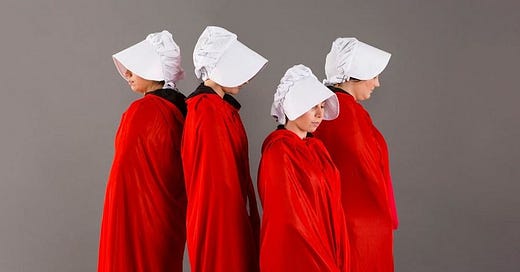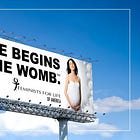Should we all dress up as Red Bugs this Halloween?
Move over Handmaid’s Tale, I propose a spookier costume for this year
I really really really wanted to have a cheerful, light, fun, Halloween-themed piece out this week but DAMN I have some serious election anxiety right now… so we’re going a bit darker.
Feel free to fully skip this one if it’s just all too much. I understand.
“Now, I recognize that there are a lot of angry, disillusioned people out there, upset with the slow pace of change, and I get it. It is reasonable to be frustrated. We all know we have a lot more work to do in this country. But to anyone out there thinking about sitting out this election or voting for Donald Trump or a third-party candidate in protest because you’re fed up, let me warn you, your rage does not exist in a vacuum. If we don’t get this election right, your wife, your daughter, your mother, we as women will become collateral damage to your rage.” – Michelle Obama
Remember when people dressed up as Handmaids for Halloween? The show had recently premiered based on the super prescient 1985 Margaret Atwood novel1, and the costume had just the right degree of political statement for the shock we all felt after Hillary lost the 2016 election….

Even Kylie Jenner got in on this trend (not exactly in the best taste though)
Fast forward to today, 2024, with the effects of Dobbs in motion, the current conservative political rhetoric, and the insanity of Project 2025, it is easier than ever to feel the anxiety of a future a little to close to The Handmaid's Tale.
However, it’s not the red capes and white bonnets that are freaking me out this year. The analogy haunting me the most is actually that of the female Japanese Red Bug.
Wait, why is a little bug haunting me?
During the pandemic, my family got really into nature shows. One segment from a BBC Life series hit a little too close to home for that moment in time and lodged itself into my brain. The segment focused on the female Japanese Red Bug.
The camera angle starts in the nest, capturing the mother beetle as she watches her eggs hatch. It then follows her as she ventures out to find food over and over and over again for her always-hungry brood. The close-in shots show her tirelessly brushing off the tiny baby beetles crawling over her working body as she endlessly provides for them. The final shot starts on the teaming mass of growing beetles, then shifts focus until it finds the mother Red Bug, legs up, dead from exhaustion, with her babies quietly feeding on her carcass. The gentle voiceover of Sir David Attenborough points out the obvious: “[the brood’s] success has come at a cost. The mother has worked herself to death.” Oof.
Watch this video and let me know how it hits you:
Right?!
Ok, we’re not insects BUT…
This country wants to breed future workers.
Without additional systemic support for parents (and/or with the doubling down of the conservative view of “family” discussed more below) this will inevitably rely on the sacrifice of the maternal body.
While this sacrifice may not be reflected in differences in lifespan for human women, as it does for the evolution-fated female Japanese Red Bug, I believe that it is already being reflected in women’s health span.
According to a recent McKinsey report, “women spend more of their lives in poor health and with degrees of disability [than men].” The report cites that nearly half of this gendered health burden relates to conditions that disproportionately affect women over men. These gender-skewed conditions include headache disorders, autoimmune disease, and depression. Each of those health conditions can be considered stress-related illnesses. As we know from my yelling off this Substack rooftop, and from the Surgeon General, the connections between the stress of parenting (experienced more heavily by mothers) and negative health outcomes are clear.
Women should not have to accept the inevitability of a compromised health span as a consequence of parenting.
Makes me want to shout: “We will not be your Red Bugs!”
I may be preaching to the choir a bit, but I want to pick apart the conservative rhetoric – how the issues and oppositions currently painted in the twisted context of “family values” are only possible through maternal body sacrifice. I also want to recognize that there are key, tide-changing policy solutions and cultural narratives on the line that truly value the family AND support women’s health.
How cultural narratives and related policies affect maternal stress loads
Let’s just start with the obvious – most “pro-family” discussion on the conservative side of the ticket tends to rely on an outdated view of “family”: dad, mom, kids. Dad is responsible for financially supporting the family. Mom is responsible for caregiving and taking care of the home. In the picture, the parenting couple is married, different gendered, and white. They also fit neatly into an assumed income bracket that does not require any social services for basic needs.
When the principles and policies of the right revolve around narrow image of family, paid leave and child care can be painted as unnecessary when its assumed that mom does not work — she can stay home and take care of the children. She can also pick up any additional work of caregiving for aging family members or those with medical needs so, no need for expanding coverage for elder care. Abortion and contraception are not necessary when the main goal of American families is growth. Valuing the caregiver in the workplace (regardless of gender) is bypassed when there is a clear gender separation between the roles of worker and caregiver.
Obviously, this is not the reality of the American population.
Forcing families to fit into that box while strengthening the walls with confined narratives and restrictive policy is not only discriminatory, it is also further adding to the parenting stress that is impacting our health. Gendering home life disproportionately piles this stress onto women.
While it’s tempting to walk through the ENTIRE stressor map and point out the fallacy in the emphasis that women will do just fine under a T/V White House, let’s go very high level and consider three of the most obvious policies at stake:
Child care:
Accessible, affordable, stable, safe child care connects with parental health on many levels. Especially mental health, regardless of which parent is working for pay. According to Julie Kashen, senior fellow and director for women’s economic justice at The Century Foundation: “We can start by supporting policy focused on lowering child care costs. And then we can imagine a future where we work towards a north star vision of guaranteed child care for every family.”
The conservative “pro-family” box confines the expectation to women do the care work, resulting in a stance that offers complicated non sequiturs to straightforward questions and suggests solutions that are overly reliant on an aging population to step into the unpaid labor roles. We cannot work towards a north star of universal child care, a key parental stress reduction tool, if we do not value the role that child care plays for all types of families.
Paid leave:
Having protected and paid time to step into a caregiving role is critical to health, whether this time is needed following pregnancy or when caring for the medically ill at any point in life.
Women make up the majority of family caregivers. A good number of them are sandwich generation2 – caring for both younger and older generations. There are elements of stress in caregiving - for babies, children, the aging, those with medical needs – that are often inevitable. However, adding financial instability and job insecurity to this weight unnecessarily increases the burden.
“I have lost count of the number of caregivers who came to me for mental health care who have now become patients with their own medical problems. Rates of depression, anxiety, and insomnia are skyrocketing in caregivers, and increasingly caregivers are experiencing cardiovascular problems, likely driven or exacerbated by the stress of caregiving.” – Dr. Allison Applebaum, Professor and Director of the Center for Caregiving, Brookdale Department of Geriatrics and Palliative Medicine, Icahn School of Medicine at Mount Sinai.
Paid leave for all is a straightforward solution for an intensely stressful time of life and we need to recognize that “women will do it for free” is not an acceptable stance.
Abortion access
Limiting access to abortion care affects parental stress on levels beyond the basics. In addition to the health repercussions of being denied a wanted abortion, restricted access to abortion as life-saving care if needed can be a significant source of anticipatory fear that may affect mental health while stealing stress-buffering joy away from the experience. Furthermore, restriction laws may add additional trauma to an already traumatic moment when birth complications arise.
The fertility journey, pregnancy, and the postpartum period are physiologically vulnerable windows for maternal health. Limiting access to healthcare that may include abortion (or even procedures/medicine associated with abortion) adds an unnecessary elevated baseline fear and additional moments of stress that pile onto the stress load parents already experience during this sensitive life transition.
In the family structure that the conservatives hold high in their “pro-family” vision, the mother carries a majority of the parental stress load, while sacrificing her own well-being and her own body to preserve an impossible standard.
Of course, this is not just about mothers. Anyone who falls outside the conservative “family” box will be disproportionately impacted by these political stances.
As stated in the Surgeon General Advisory on parenting stress and mental health:
“Recognizing and understanding family structures, including single-parent families, blended families, kinship families, foster parent families, cohabiting partner families, same-sex and non-binary parent families, and multi-generational households, among others, is important as each involves unique dynamics that can present both opportunities and challenges for parents’ and caregivers’ mental health and well-being.”
We need to see all types of families. We need to support all types of families. And we need to understand the health impacts for those who carry the most weight when the system fails.
I am probably the only one nerdy enough to think that a Japanese Red Bug costume will make a political statement this Halloween. But, I can’t shake the feeling that maternal sacrifice is on the ballot this year. And it’s freaking me out.
How are you holding up?
To lighten the mood and stay festive, a little reflect back to a time when my kids could not revolt against my terrible, homemade costumes.
Pretty proud of this one. Not a single kid protest about it:
Fun fact!
I used a quote from The Handmaid's Tale in my AP English exam for an essay question focused on the use of language in literature.
The quote I used — "below the waist, the commander is fucking me" — with a focus on the use of the word “fucking”.
I got a 5 (the highest score possible, for those unfamiliar with the American Advanced Placement system). I guess the grading staff appreciated my argument and discussion of rape versus sex grounded in true passion/love 😄.
That was 1999. Would that fly today?









This was really powerful and also heart breaking. Thank you for this.
“I believe that it is already being reflected in women’s health span.
According to a recent McKinsey report, “women spend more of their lives in poor health and with degrees of disability [than men].”
This feels so true. And the red bugs remind me of the Giving Tree 😱 .